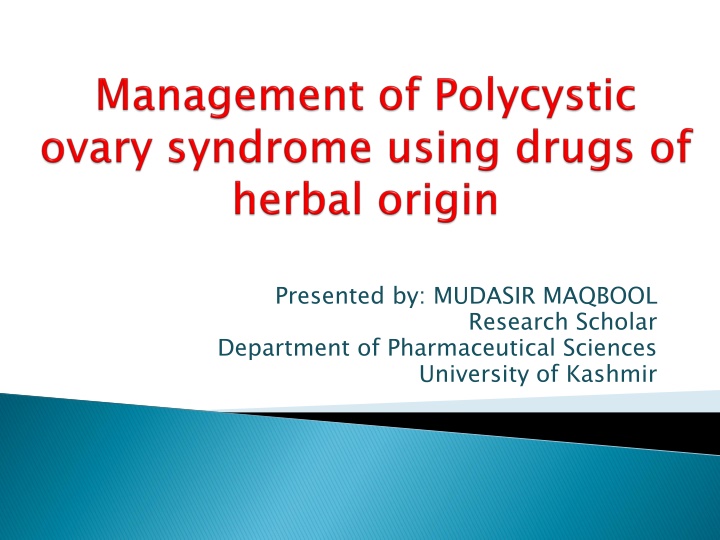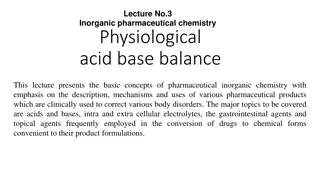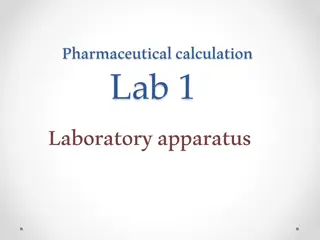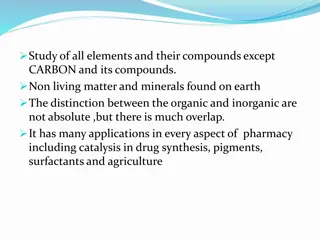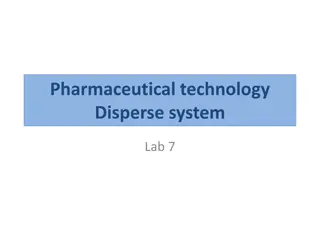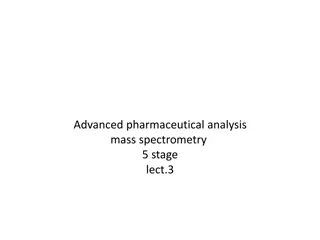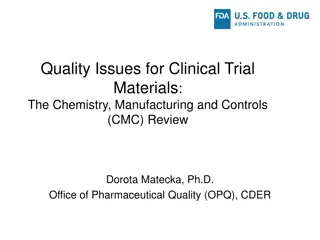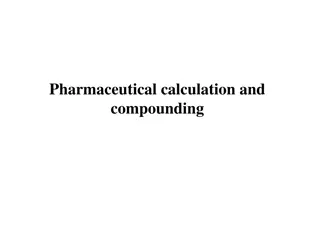Presented by: MUDASIR MAQBOOL Research Scholar Department of Pharmaceutical Sciences University of Kashmir
Polycystic ovary syndrome (PCOS) is a prevalent hormonal condition affecting women, presenting with various health issues such as menstrual irregularities, infertility, hirsutism, and metabolic disturbances. The etiology of PCOS remains complex, involving genetic and environmental factors contributing to hormonal imbalances. Despite challenges in pathophysiology assessment, research efforts have focused on identifying effective management strategies, including lifestyle modifications and pharmacological interventions. Guidelines emphasize the importance of exercise therapy and dietary adjustments in PCOS management.
Download Presentation

Please find below an Image/Link to download the presentation.
The content on the website is provided AS IS for your information and personal use only. It may not be sold, licensed, or shared on other websites without obtaining consent from the author.If you encounter any issues during the download, it is possible that the publisher has removed the file from their server.
You are allowed to download the files provided on this website for personal or commercial use, subject to the condition that they are used lawfully. All files are the property of their respective owners.
The content on the website is provided AS IS for your information and personal use only. It may not be sold, licensed, or shared on other websites without obtaining consent from the author.
E N D
Presentation Transcript
Presented by: MUDASIR MAQBOOL Research Scholar Department of Pharmaceutical Sciences University of Kashmir
Polycystic endocrine disorder, leading to several health complications, including menstrual dysfunction, infertility, hirsutism, acne, obesity, and metabolic syndrome. Polycystic ovary syndrome (PCOS) is a complex condition characterized irregularities, and/or small cysts on one or both ovaries. Polycystic ovary syndrome (PCOS) is one of the most common premenopausal women. Heterogeneous by nature, PCOS is defined by a combination of signs and symptoms of androgen excess and ovarian dysfunction in the absence of other specific diagnoses. The etiology of this syndrome remains largely unknown, but mounting evidence suggests that PCOS might be a complex multigenic environmental influences, including diet and lifestyle factors. PCOS is frequently associated with abdominal adiposity, insulin cardiovascular risk factors. ovary syndrome (PCOS) is a heterogeneous by elevated androgen levels, menstrual endocrine and metabolic disorders in disorder with strong epigenetic and resistance, obesity, metabolic disorders and
The exact pathophysiology of PCOS is complex and remains largely unclear. Genetic and environmental contributors to hormonal disturbances combine with dysfunction abnormalities to contribute to the aetiology of PCOS. pathophysiological contributors in PCOS have been hampered by a lack of ideal methods to assess either hyperandrogenism or insulin resistance. Hyperandrogenism contributor to PCOS etiology, detected in around 60% to 80% of cases. Insulin resistance is a pathophysiological contributor in around 50% to 80% of women with PCOS, especially in those with more severe PCOS diagnosed on National Institutes of Health (NIH) criteria and in women who are overweight. other factors, and including hypothalamic obesity, ovarian pituitary However, greater understanding of is a well established
We conducted an exclusive search using various PUBMED, BMJ, LANCET, WHO Website, Unicef Website related about Polycystic Ovary Syndrome and various drugs showing promising results in the syndrome. electronic databases such as: and Google Scholar for studies management of polycystic ovary
PCOS is a highly prevalent heterogeneous syndrome androgen excess, ovulatory dysfunction and polycystic ovaries (PCO). Despite it being one of the most common reproductive health problems of women, its effective challenge to medical profession. of clinical and/or biochemical treatment remains a significant
Guidelines recommend exercise therapy and calorie- restricted diet as a crucial part of the management of obesity modifications are considered as a cost-effective first line treatment and as a necessary adjunct to medication. Because treatment is directed at the symptoms. Few treatment approaches improve all aspects of the syndrome, and the patient s desire for fertility may prevent her from seeking treatment despite the presence of symptoms. Treatment goals should include correcting anovulation, inhibiting the action of androgens on target tissues, and reducing insulin resistance. Weight reduction for obese patients with PCOS is beneficial in many ways. Weight loss helps to decrease androgen, luteinizing hormone (LH), and insulin levels. in women with PCOS. In fact, lifestyle the primary cause of PCOS is unknown,
Insulin resistance, obesity and elevated levels of male hormones (androgens) are associated with PCOS. The deskbound lifestyle, dietary variations, lack of exercise and stress etc. are also contributory factors. Many Grifola Tinospora Cordifolia, etc., have been highly esteemed sources which have the advantages to reduce PCOS and also having hypoglycemic and anti-obesity effect plants like Asparagus Lepidium Racemosus, meyenii, frondosa,
Asparagus Racemosus (Shatavari) Asparagus traditionally used in Indian medicine (Ayurveda). It helps in promoting normal development of ovarian follicles, regulates menstrual cycle and revitalizes the female reproductive system mainly due to its phytoestrogen (natural plant based estrogen). hyperinsulinemia. racemosus, (Asparagaceae) is It also helps in combating the
Tinospora Cordifolia (Guduchi) Tinospora cordifolia, (Menispermaceae) is a well known medicinal plant for its hypoglycemic effects . Tinospora Cordifolia is a powerful anti- inflammatory herb. Chronic inflammation in tissues is the root cause for insulin imbalance and ovarian cysts. It helps in lowering insulin resistance, revitalizing all the body tissues and boosting a metabolism naturally.
Foeniculum vulgare (Shatapushpa) Foeniculum vulgare, (Apiaceae) seeds are used as a good supplement for management of PCOS. They are rich source of phytoestrogens. Phytoestrogens reducing insulin resistance and in bringing down believed that it helps in reducing the cellular imbalance disturbances in PCOS. content in fennel helps in the inflammation in PCOS. It also which leads to metabolic
Ocimum tenuiflorum (Holy Basil) Ocimum traditional herbal medicine commonly known as Tulsi. Ocimum tenuiflorum is potentially effective for polycystic ovarian syndrome. It has got excellent anti-androgenic properties to decreasing (Hyperandrogenism). tenuiflorum L. (Lamiaceae) is a the androgen production
Actaea racemosa (Black Cohosh) Actaea racemosa (Ranunculanae) is used in various disorders of female reproductive system viz. anovulation, infertility, hormonal balance which are important issues in PCOS. Black Cohosh has the ability to induce ovulation in women with polycystic ovarian syndrome (PCOS) . Actaea racemosa was renowned as a women s remedy associated with childbearing and the menstrual cycles. It was effective in treating amenorrhea, other menstrual, and uterine conditions. leucorrhea, dysmenorrhea and
Lepidium meyenii (Maca) Lepidium meyenii from Brassicaceae family is a traditional herbal medicine used in relieving menopausal endocrine system and act as natural hormonal balancer without side effects. Estrogen and progesterone hormones in the body help in encouraging a healthy menstrual cycle. It is an adaptogen and an incredible fertility super food. Lepidium meyenii restores the levels of testosterone in the Males symptoms, stimulates the
Grifola frondosa (Maitake Mushroom) Grifola frondosa (Meripilaceae) is a perennial fungus widely used in hypoglycemic effect, and May beneficial in the management of Diabetes. Grifola frondosa extract can able to induce the ovulation in women with polycystic ovarian syndrome (PCOS) in animal studies . The proposed frondosa is modulation of blood glucose levels and enhancement of insulin sensitivity mechanism of action of Grifola
Taraxacum officinale (Dandelion Root) Taraxacum effective detoxifier. It is used to cleanse the liver and get rid of any build-up of hormones. This clean up can stimulate the production of SHGB which reduce the free testosterone in the blood which is used in PCOS treatment because menstrual irregularities are often affected by the liver which hormones. It also helps in removal of toxin from the body, thus helping the women who are menstrual issues. officinale bile (Asteraceae) stimulant is an flow and liver is being backed up with excessive experiencing fertility problems and
Pergularia daemia (Veli paruthi) Pergularia daemia (Asclepiadaceae) known as Veliparuthi in Tamil, Uttaravaruni in Sanskrit. Traditionally Pergularia daemia is used for its various potential irregularities cycle. So the restoration of the estrous cycle reduces the development of follicular cyst . pharmacological effect and activities. It has on normalizing regularizing menstrual the estrous
Galega officinalisi (Goats Rue) Galega officinalisi (Fabaceae) requires more clinical studies to reveal its beneficial effect in women with polycystic ovarian syndrome. Galega officinalisi has been known since the middle ages for reliving the symptoms of diabetes mellitus, it turned out into guanidine, a substance that decreases blood sugar by decreasing insulin resistance. However, it is the natural source of guanidine which is an anti- diabetic drug from biguanides class. A commonly used drug for PCOS is Metformin which belongs to the biguanide class. This association alone should garner this herb as a second look for treating polycystic ovarian syndrome
Areca catechu (Betal Palm) Areca catechu (Arecaceae) tenderly maintains the healthy production of female hormones & relieves congestion of the blood vessels in abdominal healthy menopausal transition and helps in supporting healthy retentive power of the uterus and used to remove debility after child birth. area. Areca reproductive catechu maintains eases female system, libido. It helps in increasing the
Cinnamomum zeylanicum (Cinnamon) Clinical significant reduction in insulin resistance by increasing activity in the insulin signaling pathway due to the presence of insulin potentiating factor which carbohydrate metabolism. trial on PCOS women showed phosphatidylinositol 3-kinase enhances the insulin activity in
Glycyrrhiza glabra (Liquorice) studies confirmed that it reduces serum testosterone probably hydroxysteroid lyase in PCOS. Clinical conducted on liquorice due to the block of 17- dehydrogenase and 17-20
Nigella sativa Linn (Kalonji) Kalonji oil was proved to be effective in patients of insulin resistance syndrome and in alleviating the obesity mainly due to its insulin sensitizing action. Various components of kalonji like thymoquinone, thymol, unsaturated fatty acids, lipase and tannins are responsible for its beneficial effects in insulin resistance syndrome.
Many studies across the world have confirmed that PCOS can be treated with herbal remedies and lifestyle management. Unani physicians have recommended regular induction of menstruation as one of treatment modality applied for women who suggestive of PCOS. Management temperament, menstrual regulation by use of emmenagogue drugs and local application of herbs to reduce the severity of hair growth, acne and hyper pigmentation due to PCOs have also been reported has developed masculine features based on correction of
Preclinical and clinical studies have provided preliminary evidence that herbal medicines may have beneficial effects for women with PCOS. protocols have been followed to improve the quality of life in these patients. However mechanisms of effect for herbal extracts are needed to complete our understanding of the reproductive herbal medicine for this condition. In addition alternate therapeutic Further investigations into the endocrinological effects for
Maqbool syndrome- a multifaceted disease: a review. Int J Pharm Sci & Res 2019; 10(3): 1072-79. Maqbool M, Dar MA, Gani I, Geer MI, Insulin Resistance and Polycystic ovary Syndrome: A Review, Journal of Drug Delivery and Therapeutics. 2019; 9(1-s):433-436. Mohd M, Maqbool M, Dar MA, Mushtaq I, Polycystic Ovary Syndrome, a modern epidemic: An overview, Journal of Drug Delivery and Therapeutics. 2019; 9(3):641-644. Pachiappan Muthusamy syndrome: International Journal of Herbal Medicine 2017; 5(2): 78-80. Dr. Fathima KF and Dr. Shameem I. An approach to the management of poly cystic ovarian disease in Unani system of medicine: A review International Journal of Applied Research 2016; 2(6): 585-590. M, Gani I and Geer MI: Polycystic ovarian S, A Matheswaran G. Medicinal plants for polycystic ovary review S, phytomedicine Pushkalai P S and of research
